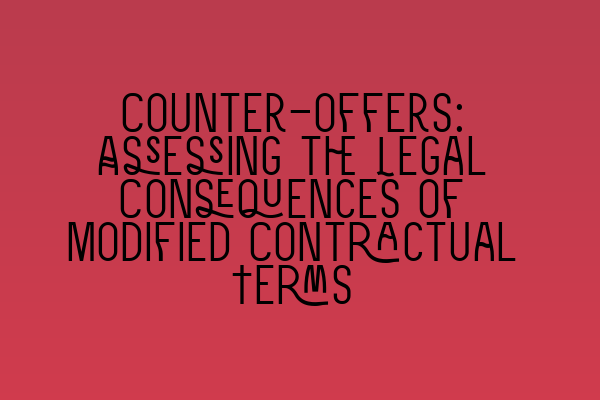Counter-offers: Assessing the Legal Consequences of Modified Contractual Terms
When it comes to contract negotiations, counter-offers often play a crucial role. As a solicitor, it is indispensable to have a comprehensive understanding of the legal implications that arise when parties modify the terms of a contract. In this blog post, we will explore the concept of counter-offers, the legal consequences associated with them, and how they affect the validity and enforceability of contracts.
What is a Counter-offer?
A counter-offer occurs when one party makes alterations or modifications to the terms of an original contract proposed by the other party. Essentially, it represents a rejection of the original offer and the initiation of a new negotiation process.
For instance, let’s imagine a scenario where Party A offers to sell their car to Party B for £10,000. Instead of accepting the offer, Party B responds by proposing a counter-offer of £9,000. In this situation, Party B’s counter-offer automatically rejects Party A’s initial offer and demonstrates an intent to enter into a new agreement based on revised terms.
Intention to Create Legal Relations
In contract law, one of the fundamental requirements is the intention of the parties to create legal relations. When a counter-offer is made, it essentially extinguishes the original offer and creates a new agreement with modified terms. Therefore, it is crucial to assess whether the counter-offer demonstrates an intent to create legal relations.
It is important to note that a counter-offer can be either an invitation to treat or a binding offer. An invitation to treat is a preliminary stage of negotiation, where neither party intends to be bound by the terms proposed. On the other hand, a binding offer signifies a clear intention to be legally bound by the counter-offer.
To determine the intention to create legal relations, solicitors need to examine the language used in the counter-offer, the context of the negotiation, and any subsequent conduct of the parties. These factors can help in establishing whether the counter-offer amounts to a binding offer or merely an invitation to treat.
Impact on Acceptance
Counter-offers also have a significant impact on the acceptance of a contract. In the context of traditional offer and acceptance, an acceptance must be a mirror image of the original offer. Any modifications or alterations proposed in the counter-offer will be treated as a rejection of the original offer and an entirely new offer.
For example, if Party A offers to sell their car for £10,000 and Party B counters with an offer of £9,000, Party A cannot simply accept the counter-offer without further negotiation. It would be considered a deemed rejection of the counter-offer and require Party A to make a subsequent acceptance based on Party B’s modified terms.
Consideration and Legally Binding Contracts
Consideration, another essential element of a legally binding contract, can also be affected by counter-offers. Consideration refers to the exchange of something of value, such as money, goods, or services, between the parties involved. In the context of counter-offers, the consideration offered in the original offer may not align with the revised terms proposed.
It is crucial for solicitors to carefully review the consideration offered in both the original offer and the counter-offer to ensure that the contract is legally enforceable. If the consideration is significantly different between the original offer and counter-offer, it may indicate that a new consideration has been introduced, leading to the creation of a new contract based on the counter-offer terms.
Conclusion
In conclusion, counter-offers are an integral part of contract negotiations and can have profound legal consequences. As a solicitor, it is imperative to assess the intention to create legal relations, the impact on acceptance, and the consideration offered in both the original offer and the counter-offer.
Understanding these legal implications is vital in advising clients and ensuring that contracts are enforceable and accurately reflect the terms agreed upon by the parties involved. By navigating the complexities of counter-offers effectively, solicitors can proactively protect their clients’ interests and contribute to successful contract negotiations.
Related Articles:
